Fertility Supplements For Women 2025 | Strong Boost for Fertility Goals
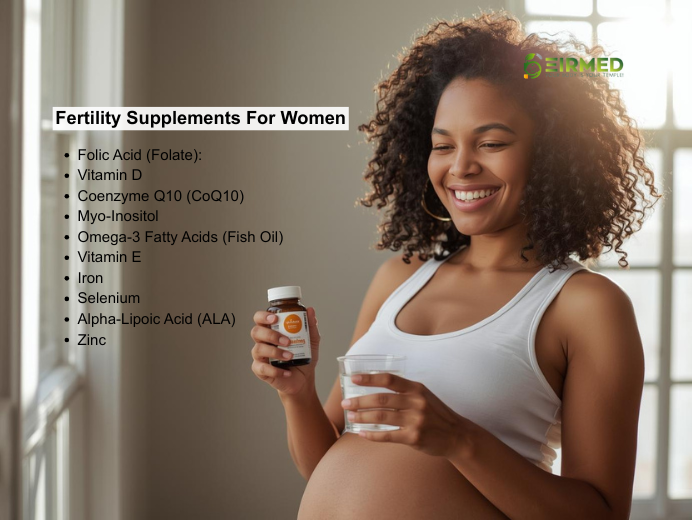
Top 10 Fertility Supplements For Women in 2025: Enhance Your Path to Parenthood | EIRMED
Fertility supplements for women are becoming a popular choice for those looking to support their reproductive health in a natural way. If you’re on the path to starting or growing your family, you might be wondering what options are out there to give your body a gentle boost. These supplements, often packed with vitamins, minerals, and herbs, aim to address common issues like irregular cycles or low energy levels that can affect conception. At EIRMED, our focus is on providing high-quality products tailored for female fertility needs, helping you feel more in control of your journey.
Have you ever thought about how everyday nutrients could play a role in your fertility? Let’s explore together what makes these supplements helpful and how they might fit into your routine. We’ll look at the science behind them, share real insights from experts, and guide you through choices that could make a difference. Remember, while supplements can be supportive, they’re best used alongside advice from your doctor.
Understanding Fertility Supplements For Women
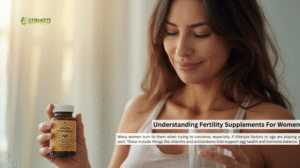
What exactly are fertility supplements for women? Think of them as targeted helpers that provide essential nutrients your body might need more of during preconception. Many women turn to them when trying to conceive, especially if lifestyle factors or age are playing a part. These include things like vitamins and antioxidants that support egg health and hormone balance.
From what we’ve learned through various studies and clinic recommendations, supplements can help fill nutritional gaps. For instance, if your diet lacks certain elements due to busy days or dietary choices, adding these can promote better ovarian function. But it’s not just about popping pills, it’s about creating a balanced approach to your health.
How Fertility Supplements For Women Can Support Your Body
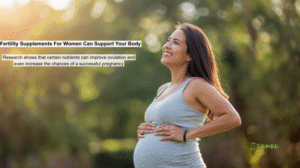 How do fertility supplements for women work their magic? It starts with the basics: many contain antioxidants that protect cells from damage, which is key for healthy eggs. Others help regulate hormones, making your cycles more predictable. Imagine your body as a garden, these supplements provide the right soil and water to help things grow.
How do fertility supplements for women work their magic? It starts with the basics: many contain antioxidants that protect cells from damage, which is key for healthy eggs. Others help regulate hormones, making your cycles more predictable. Imagine your body as a garden, these supplements provide the right soil and water to help things grow.
Research shows that certain nutrients can improve ovulation and even increase the chances of a successful pregnancy. For example, studies have found that women with adequate levels of specific vitamins often have better outcomes when trying to conceive. But everyone’s body is different, so what works for one person might need tweaking for another. Have you checked your own nutrient levels lately? A simple blood test could reveal if you’re low on something important.
Top 10 Fertility Supplements For Women to Consider
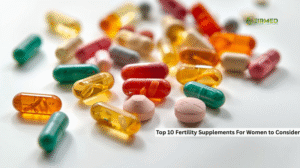 Let’s dive into some of the best fertility supplements for women based on current insights from fertility experts and clinics. We’ll cover what each one does, why it might help, and any tips for use. At EIRMED, we stock many of these in forms that are easy to take and backed by quality standards.
Let’s dive into some of the best fertility supplements for women based on current insights from fertility experts and clinics. We’ll cover what each one does, why it might help, and any tips for use. At EIRMED, we stock many of these in forms that are easy to take and backed by quality standards.
1. Folic Acid (Folate): This is often the first recommendation for women planning pregnancy. It supports cell growth and can reduce the risk of birth defects. Studies suggest it also aids in better egg development and higher live birth rates. Aim for 400-800 micrograms daily, starting before you conceive.
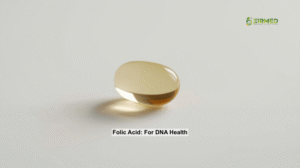
- Role in the Body: Folic acid helps the body make new cells, including red blood cells. It’s especially important during periods of rapid growth, such as pregnancy and infancy.
- Sources: You can find folic acid in fortified foods like cereals, bread, and pasta. The natural form, called folate, is found in leafy green vegetables (spinach, kale), legumes (beans, lentils), citrus fruits, and avocados.
- Benefits: It helps prevent neural tube defects in developing babies, supports DNA synthesis and repair, and aids in cell division.
- Deficiency: Low levels can lead to anemia, fatigue, and, in pregnant women, increased risk of birth defects.
- Supplements: Many people, especially women who are pregnant or planning to become pregnant, are advised to take folic acid supplements.
2. Vitamin D: Many women are low in this sunshine vitamin, which plays a role in hormone regulation and embryo quality. Research indicates that sufficient levels can boost pregnancy rates significantly. If you spend a lot of time indoors, this could be a game-changer for you.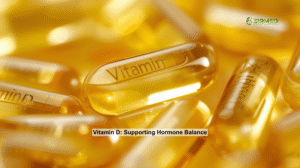
- Role in the Body: Vitamin D helps your body absorb calcium and phosphorus, which are essential for strong bones and teeth. It also supports immune system function and muscle health.
- Sources:
- Sunlight: Your skin produces vitamin D when exposed to sunlight.
- Foods: Fatty fish (like salmon, mackerel, and sardines), egg yolks, fortified milk, and cereals.
- Supplements: Often recommended for people who have limited sun exposure or dietary intake.
- Benefits:
- Maintains healthy bones and teeth
- Supports immune system health
- May help regulate mood and reduce the risk of certain diseases
- Deficiency:
- Can lead to bone disorders such as rickets in children and osteomalacia or osteoporosis in adults
- Symptoms may include fatigue, bone pain, muscle weakness, or mood changes
3. Coenzyme Q10 (CoQ10): As an antioxidant, it helps with energy production in cells, which is vital for egg quality. Clinics often suggest it for women over 35, with evidence showing improved fertilization and pregnancy outcomes. Typical doses are 200-600 mg per day.
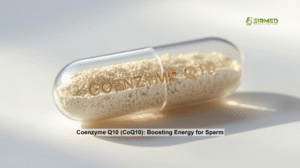
- Role in the Body:
- CoQ10 helps generate energy in your cells, particularly in the heart, liver, and kidneys.
- It acts as an antioxidant, protecting cells from damage caused by free radicals.
- Sources:
- Your body makes CoQ10, but you can also get small amounts from foods like fatty fish (salmon, tuna), organ meats (liver, kidney), whole grains, and some vegetables.
- CoQ10 is also available as a dietary supplement.
- Benefits:
- Supports heart health and may help with certain heart conditions.
- May improve energy levels and reduce fatigue.
- Supports healthy skin and may help reduce the effects of aging.
- Acts as an antioxidant, supporting overall cell health.
- Deficiency:
- Rare, but levels can decrease with age or certain medical conditions.
- Symptoms may include fatigue, muscle weakness, and neurological issues.
4. Myo-Inositol: Great for those with irregular cycles or PCOS, it helps balance insulin and promotes ovulation. Trials have shown it can lead to spontaneous cycles and higher conception rates. It’s like a natural reset for your hormones.
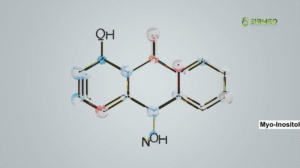
- Role in the Body:
- Myo-Inositol is involved in cell membrane formation and helps regulate insulin and neurotransmitter activity.
- It supports healthy nerve function and hormone balance.
- Sources:
- Found in many foods, especially fruits (like cantaloupe and oranges), beans, grains, and nuts.
- The body can also produce myo-inositol from glucose.
- Benefits:
- Supports reproductive health, especially in women with polycystic ovary syndrome (PCOS).
- May help improve insulin sensitivity and support metabolic health.
- Plays a role in mood regulation and may support mental well-being.
- Supplements:
- Often used as a supplement for PCOS, fertility support, and mood balance.
- Generally considered safe, but it’s best to consult a healthcare provider before starting any supplement.
5. Omega-3 Fatty Acids (Fish Oil): These support overall inflammation reduction and may delay ovarian aging. Women with higher omega-3 levels often see better egg quality and pregnancy chances. Look for EPA and DHA in your supplement.
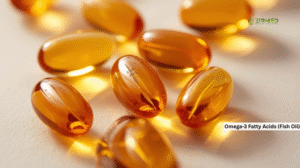
Key Types:
- EPA (Eicosapentaenoic Acid): Supports heart health and reduces inflammation.
- DHA (Docosahexaenoic Acid): Important for brain and eye health.
- ALA (Alpha-linolenic Acid): Found in plant sources; can be converted to EPA and DHA in small amounts.
Sources:
- Fish Oil: Salmon, mackerel, sardines, anchovies, and herring are rich in EPA and DHA.
- Plant Sources: Flaxseeds, chia seeds, walnuts (mainly ALA).
- Supplements: Fish oil capsules and algae oil (vegetarian option).
Benefits:
- Supports heart health by lowering triglycerides and blood pressure.
- Promotes brain health and may improve mood.
- Reduces inflammation and supports joint health.
- Important for eye health and development.
Deficiency:
- May lead to dry skin, fatigue, poor memory, and mood swings.
Tips:
- Aim for 2 servings of fatty fish per week, or consider supplements if you don’t eat fish.
- Consult a healthcare provider before starting supplements, especially if you take blood thinners.
6. Vitamin E: Another antioxidant that protects reproductive cells. It’s been linked to better implantation and embryonic development. Pair it with a balanced diet for the best results.
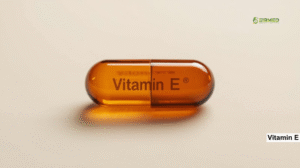
Here are some key points about vitamin E:
- Sources: You can find vitamin E in foods like nuts (especially almonds), seeds, spinach, broccoli, vegetable oils (such as sunflower and safflower oil), and fortified cereals.
- Benefits: It helps maintain healthy skin and eyes, strengthens the immune system, and may help prevent oxidative stress.
- Deficiency: While rare, vitamin E deficiency can cause nerve and muscle damage, vision problems, and weakened immune response.
- Supplements: Some people take vitamin E supplements, but it’s best to get it from food unless advised by a healthcare provider.
7. Iron: Essential for oxygen transport and healthy ovulation. Low iron can lead to fatigue, which isn’t helpful when trying to conceive. Women with anemia might benefit most from this.
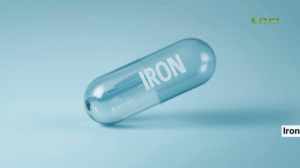
Role in the Body:
- Helps transport oxygen from the lungs to tissues.
- Supports energy production and metabolism.
- Important for immune system function.
Sources:
- Animal sources (heme iron, easily absorbed): Red meat, poultry, fish, and seafood.
- Plant sources (non-heme iron, less easily absorbed): Beans, lentils, tofu, spinach, fortified cereals, and nuts.
- Tip: Vitamin C (from citrus fruits, tomatoes, etc.) can help your body absorb more iron from plant sources.
Benefits:
- Prevents iron-deficiency anemia, which can cause fatigue, weakness, and pale skin.
- Supports healthy growth and development, especially in children and pregnant women.
Deficiency:
- Symptoms include tiredness, weakness, shortness of breath, and difficulty concentrating.
- At risk: Women (especially during pregnancy), infants, young children, and people with certain health conditions.
Supplements:
- Sometimes recommended if you can’t get enough iron from food.
- Always consult a healthcare provider before starting iron supplements, as too much iron can be harmful.
8. Selenium: Works with other antioxidants to improve sperm and egg health, though more for couples. It may help prevent miscarriage in some cases.
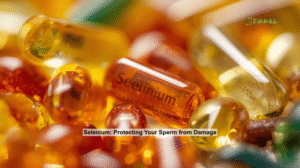
Role in the Body:
- Acts as an antioxidant, protecting cells from damage caused by free radicals.
- Supports thyroid gland function and hormone production.
- Contributes to a healthy immune system.
- Plays a role in DNA synthesis and reproduction.
Sources:
- Brazil nuts (one of the richest sources)
- Seafood (tuna, sardines, shrimp)
- Meats (beef, turkey, chicken)
- Eggs
- Whole grains and some dairy products
Benefits:
- Helps prevent cell damage and supports overall cellular health.
- Supports proper thyroid function and metabolism.
- May help boost immunity and protect against certain infections.
- Contributes to reproductive health.
Deficiency:
- Rare, but can lead to weakened immune function, thyroid problems, and, in severe cases, heart and joint issues.
- At risk: People with certain digestive disorders or living in areas with low-selenium soil.
Supplements:
- Usually not necessary with a balanced diet.
- Excessive intake can be toxic; always consult a healthcare provider before using supplements.
Tips:
- A single Brazil nut can provide more than the daily recommended amount of selenium.
- Balance is important; both deficiency and excess can cause health problems.
9. Alpha-Lipoic Acid (ALA): Helps with egg maturation and embryo quality. Small studies show promise in increasing the number of viable eggs during fertility treatments.
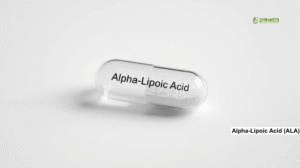
Role in the Body:
- Supports energy production by helping enzymes turn nutrients into energy.
- Acts as an antioxidant, neutralizing harmful free radicals.
- Regenerates other antioxidants, such as vitamins C and E.
- Supports healthy nerve function.
Sources:
- Small amounts are found in foods such as spinach, broccoli, potatoes, yeast, and organ meats (liver, kidney, heart).
- The body also produces ALA in small quantities.
- Available as a dietary supplement.
Benefits:
- May help manage blood sugar levels, especially in people with diabetes.
- Supports nerve health and may help with symptoms of neuropathy.
- Contributes to overall antioxidant protection and cellular health.
- May support skin health and reduce signs of aging.
Deficiency:
- Deficiency is rare, as the body produces ALA and it is present in various foods.
Supplements:
- Often used for antioxidant support, nerve health, and blood sugar management.
- Generally considered safe, but high doses may cause side effects; consult a healthcare provider before use.
Tips:
- ALA supplements are best taken on an empty stomach for optimal absorption.
- Balance supplementation with a healthy diet rich in natural antioxidants.
10. Zinc: Supports hormone balance and DNA synthesis. While more studied in men, it aids women’s fertility by promoting regular cycles.
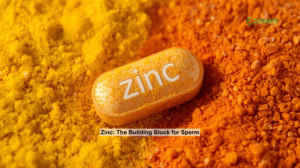
Role in the Body:
- Supports immune system function and helps fight off infections
- Aids in wound healing and tissue repair
- Essential for DNA synthesis and cell division
- Supports normal growth and development during pregnancy, childhood, and adolescence
- Contributes to the senses of taste and smell
Sources:
- Animal sources: Red meat, poultry, seafood (especially oysters, crab, and lobster), dairy products, eggs
- Plant sources: Beans, nuts, whole grains, fortified cereals
- Note: Zinc from animal sources is more easily absorbed than from plant sources
Benefits:
- Strengthens the immune system
- Promotes healthy skin and helps heal wounds
- Supports normal growth and development
- May help reduce the duration and severity of the common cold
Deficiency:
- Symptoms include weakened immunity, slow wound healing, loss of appetite, hair loss, and impaired taste or smell
- At risk: Vegetarians, pregnant and breastfeeding women, people with digestive disorders, and those with limited dietary intake
Supplements:
- Available in various forms (zinc gluconate, zinc sulfate, zinc acetate)
- Excessive intake can cause nausea, vomiting, and interfere with the absorption of other minerals; consult a healthcare provider before use
Tips:
- Include a variety of zinc-rich foods in the diet for optimal health
- Balance is important, as both deficiency and excess can cause health issues
When choosing from these top fertility supplements for women, think about your specific needs. Are you dealing with hormonal imbalances or just wanting general support? EIRMED offers bundles that combine several for convenience.
Benefits of Taking Fertility Supplements For Women
The benefits of fertility supplements for women go beyond just conception. Many report feeling more energetic and balanced overall. Scientifically, they can enhance egg quality, which is crucial as we age. For example, antioxidants like CoQ10 fight off free radicals that damage cells.
Other perks include better mood from balanced hormones and stronger immune support. In studies from fertility centers, women using these saw higher rates of successful pregnancies, especially when combined with lifestyle changes like exercise and diet. But remember, results vary – it’s about supporting your body’s natural processes.
Potential Side Effects and Precautions
No supplement is without possible downsides. Common side effects might include mild stomach upset, headaches, or changes in digestion, especially if starting high doses. For instance, too much iron can cause constipation, while omega-3s might thin blood slightly.
Always talk to your healthcare provider before starting, especially if you have conditions like PCOS or are on medications. They can help monitor for interactions. At EIRMED, we emphasize safe, evidence-based products, but personal health comes first.
How to Incorporate Fertility Supplements For Women Into Your Routine
Starting with fertility supplements for women? Begin slow to see how your body responds. Take them with meals to aid absorption, and track your cycles to notice changes. Experts recommend using them for at least three months, as eggs take time to mature.
Combine with a fertility-friendly diet: think leafy greens, nuts, and whole grains. Stay hydrated and manage stress through yoga or walks. Have you considered journaling your progress? It can help you spot patterns and stay motivated.
When to Seek Professional Help
While supplements are helpful, they’re not a cure-all. If you’ve been trying for over a year (or six months if over 35), see a specialist. Clinics like those we referenced offer tests to pinpoint issues. EIRMED can connect you with resources for treatments alongside our products.
FAQ
What are the best fertility supplements for women over 40?
For women over 40, focus on antioxidants like CoQ10 and Vitamin D to support egg quality. Always consult a doctor for personalized advice.
Can fertility supplements for women help with PCOS?
Yes, supplements like Myo-Inositol have shown promise in regulating cycles and improving ovulation in women with PCOS.
How long do fertility supplements for women take to work?
It often takes 3-6 months to see benefits, as reproductive cells need time to develop.
Are there natural alternatives to fertility supplements for women?
A balanced diet rich in fruits, veggies, and proteins can provide similar nutrients, but supplements ensure consistent intake.
Do fertility supplements for women interact with medications?
Some can, like omega-3s with blood thinners. Check with your pharmacist or doctor.
Overall Purpose of This Guide
This guide aims to help you understand fertility supplements for women in a simple way. It shares key facts on how they support your body, like improving eggs and hormones. By choosing the right ones, you can feel more prepared for parenthood. Remember, small steps like adding vitamins can make a big difference. Stay positive and consult experts for your unique needs.
Disclaimer
This article is for informational purposes only and not a substitute for professional medical advice. Consult your healthcare provider before starting any supplements, especially if pregnant, nursing, or on medications. EIRMED products are not intended to diagnose, treat, or cure any condition. Results may vary.
Thank You
Thank you for taking the time to read this article on fertility supplements for women. At EIRMED, we’re here to support your fertility journey with reliable products and information. We appreciate your trust and hope this helps you move forward with confidence. If you have questions, reach out, we’re in this together!
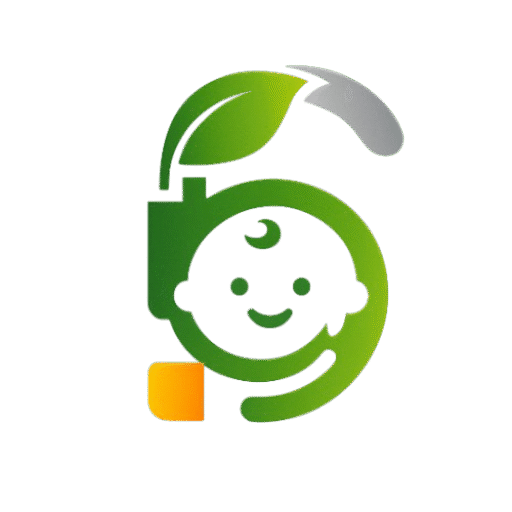
Eirmed is an informational platform dedicated to providing reliable, science-based insights on male and female fertility, reproductive health, and natural conception.
